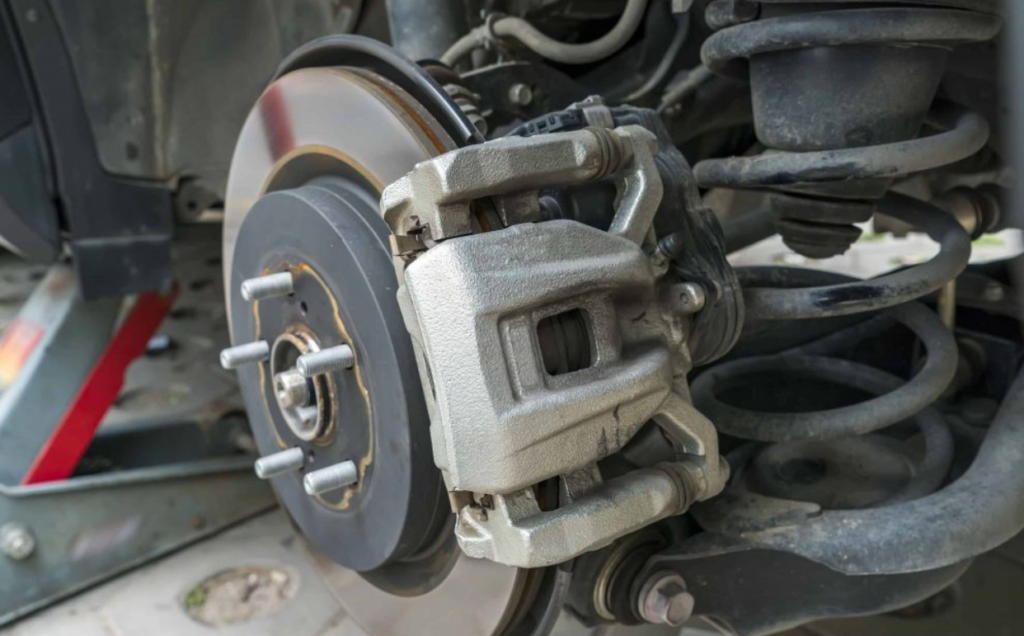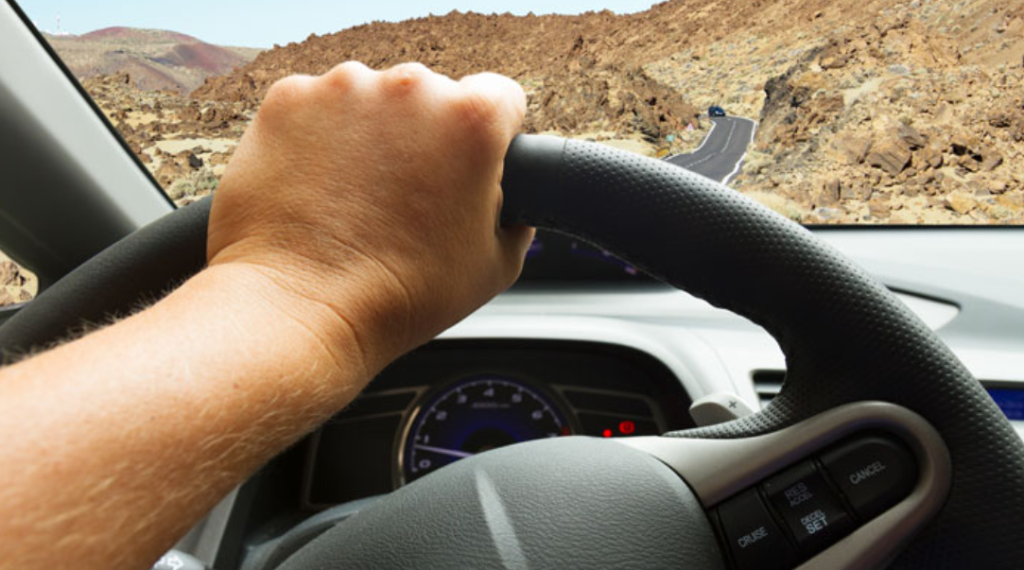Wheel bearings are essential components nestled within the car’s wheel hubs, facilitating seamless rotation of the wheels. Beyond mere rotation, they’re instrumental in safeguarding optimal performance, promoting fuel efficiency, and ensuring a smooth, vibration-free drive. Being well-acquainted with the front wheel bearing noise symptoms is paramount. Doing so not only staves off expensive mechanical interventions but also ensures you aren’t caught off guard by unforeseen vehicular malfunctions.

Roaring Noise from the Wheel Area
Perhaps the most distinguishable among the front wheel bearing noise symptoms is the roaring, often likened to the sound of the ocean when a seashell is placed next to one’s ear. This roaring noise, emanating conspicuously from the wheel area, often increases in tandem with the vehicle’s acceleration. While it may start off subdued, neglecting it leads to a pronounced and consistent roar, indicative of the bearing’s gradual wear.
Vibration in the Steering Wheel
As front wheel bearings begin their descent into wear, the driver might notice uncharacteristic vibrations in the steering wheel. These vibrations can be subtle at low speeds but tend to amplify as you pick up pace. The palpable shaking is more than a mere inconvenience; it’s an overt cry for attention, signifying bearing deterioration.
Wandering or Loose Steering
A vehicle’s trajectory is largely dictated by its bearings. Damaged or worn-out bearings can compromise this, leading to what mechanics often term as ‘wandering’ steering. This results in the vehicle veering unpredictably, which, especially at high speeds, can be perilous. Loose steering, a sister symptom, can make the car feel unstable, undermining the driver’s confidence and control.
Uneven Tire Wear
An often-overlooked front wheel bearing noise symptom is uneven tire wear. Damaged bearings can cause wheels to tilt or become wobbly, leading to inconsistent contact with the road. This skewed contact manifests as uneven tire wear, compelling drivers to replace their tires more frequently than usual.
ABS Malfunction
Modern vehicles integrate the Anti-lock Braking System (ABS) sensors with wheel bearings. When the bearings are compromised, it might throw the ABS off-kilter. Drivers might be alerted to this through dashboard warnings, which can range from flashing lights to specific malfunction messages.
Pulling to One Side While Braking
Braking should be a smooth, linear affair. However, one of the nuanced front wheel bearing noise symptoms is the car’s tendency to pull to one side when the brakes are applied. This pulling stems from bearing-induced wheel misalignment, leading to uneven brake pad contact, thus compromising braking efficiency and safety.
Feeling of Excess Play When Shaking the Wheel
For the hands-on driver, a physical check can unearth bearing issues. By lifting the car using a jack and physically shaking the wheel, one can gauge bearing health. If there’s excessive play or movement, it’s a clear red flag pointing towards bearing wear.
Grinding or Binding Sensation from the Steering
When bearings are devoid of proper lubrication or are misaligned, they can cause the steering to emit a grinding or binding sensation. This tactile feedback is more than just one of the front wheel bearing noise symptoms—it’s an urgent plea for remedial action as it implies imminent bearing failure.

Grease Leakage
Bearing health can also be ascertained visually. If there’s noticeable grease leakage around the wheel—especially on the inside of the tire or wheel—it’s a potent harbinger of bearing issues, emphasizing the importance of timely checks and maintenance.
Increasing Noise When Turning
Turns exert additional pressure on bearings. If there’s a marked noise increment during turns, especially if it surpasses the noise during straight-line driving, it’s symptomatic of compromised bearings, underscoring the pressing need for professional evaluation.
Conclusion
Understanding and recognizing the various front wheel bearing noise symptoms is more than just mechanical prudence—it’s a proactive step towards ensuring driving safety. It’s imperative to heed these auditory and tactile warning signs and prioritize regular vehicle check-ups. Should any of these symptoms manifest, seeking timely professional intervention can forestall more complex mechanical issues and keep you and your vehicle safely on the road.
FAQs
How often should wheel bearings be replaced?
Wheel bearings do not have a specific replacement interval like oil or brake pads. Generally, they should last between 85,000 to 100,000 miles under normal driving conditions. However, their longevity can vary based on factors such as driving conditions, the quality of roads, and exposure to moisture or contaminants. Regular inspections during routine maintenance checks, such as tire rotations or brake service, can identify wear or potential issues early on.
Can driving with a bad wheel bearing be dangerous?
Yes, driving with a compromised wheel bearing can be dangerous. A deteriorating bearing can cause poor vehicle handling, increase the potential for loss of control, and in severe cases, lead to the wheel coming off while driving. As the bearing worsens, the associated risks escalate. Hence, addressing wheel bearing issues promptly is crucial for safe driving.
How long does it take to replace a wheel bearing?
The duration to replace a wheel bearing can vary based on the vehicle make and model, as well as whether the bearing is bolt-on or press-fit type. On average, it might take anywhere from 1 to 3 hours. However, if the wheel bearing is severely damaged or rusted in place, the process could take longer.
Is it common for both front wheel bearings to fail simultaneously?
While it’s possible for both front wheel bearings to wear down over time due to similar driving conditions, they usually don’t fail simultaneously. If one bearing is showing signs of wear or damage, it’s a good practice to inspect the other, but it’s not always necessary to replace both unless they both show signs of wear or damage.
What’s the average cost to replace front wheel bearings?
The cost of replacing front wheel bearings can vary based on factors such as the vehicle’s make and model, labor costs in your region, and whether you’re opting for an OEM (Original Equipment Manufacturer) or aftermarket part. On average, you might expect to pay anywhere from $300 to $700, including parts and labor. High-end or luxury vehicles might incur higher costs.
Can faulty wheel bearings affect fuel efficiency?
Yes, damaged or faulty wheel bearings can lead to increased friction, causing the engine to work harder to move the vehicle, thereby reducing fuel efficiency. While the impact on fuel consumption might not be as noticeable as a tire with low air pressure, over time and distance, it can add up.
Is there a difference between rear and front wheel bearing noise symptoms?
In essence, the symptoms of failing wheel bearings—whether front or rear—are quite similar, encompassing noises, vibrations, and poor handling. However, the location of these symptoms can help differentiate between them. For instance, noises or vibrations from the front of the vehicle likely indicate issues with the front wheel bearings, while those from the rear suggest problems with the rear bearings.
How can I differentiate between a tire and front wheel bearing noise symptoms?
Tire noise is often associated with tread patterns, misalignment, or uneven wear and usually manifests as a hum or drone that varies with road speed. Wheel bearing noise, on the other hand, typically presents as a consistent growling or roaring sound that gets louder with increased speed. Rotating or aligning tires might reduce tire-related noises, but wheel bearing noises will persist irrespective of such interventions.
Can wheel bearings cause a car to fail an inspection?
Yes, if during a safety inspection, the wheel bearings are found to have excessive play, are making loud noises, or show signs of overheating, the vehicle could fail the inspection. Compromised wheel bearings are considered a safety issue, as they can affect vehicle handling and, in extreme cases, result in wheel detachment.